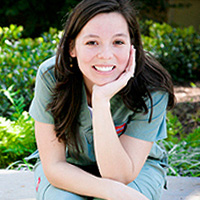Pursuing Master of Physician Assistant Studies, University of North Texas Health Science Center (Fort Worth, Texas)
Not only are people around the world diverse, so are their diseases.
Senior biology major Abby Trejo made that discovery during summer internships in Ghana and Guatemala, where she worked at an orphanage and helped with mobile medical clinics taking health care to villagers in remote locations.
This pre-med student used these experiences as part of her capstone project for the Honors College, comparing the diseases she encountered in those developing countries with illnesses she sees working at an Abilene hospital.
“There’s a lot of different illnesses you don’t see here, such as elephantiasis,” Abby said. That disease, characterized by thickening of the skin and underlying tissues, is often caused by parasitic worms. Other common ailments in Ghana include malaria and gastric problems. In Guatemala, Abby saw more cases of cataracts, as well as gastric and respiratory problems, she said.
Comparing health care
Abby also witnessed firsthand the disparity of health care availability and technologies in the United States and abroad. “In the developing world, they lack health care providers and simple medicines and education, whereas here we largely focus on prolonging and preserving life,” she said.
In Ghana, Abby worked with the Village of Hope, an orphanage that gained national attention when it was featured on the “Oprah” show. Abby spent six weeks at the village with five other ACU students as part of ACU’s World Wide Witness program.
The orphanage, which cares for about 235 West African children according to its website, is set up like a campus with a school, a church, a medical clinic and housing for the children, missionaries and interns. The on-site clinic also serves people from nearby villages who make the trek to obtain free medication for their ailments.
Heart-rending stories
“All these children are orphans so they all have a sad story to tell you,” Abby said. “Twins over there are often abandoned because people have a superstition that twins are evil,” so the village was home to several sets of twins. Other children were in the village because their parents couldn’t afford to care for them or their parents had died, she said.
Abby spent a lot of time with the children, as well as working in the clinic. “We planned game days for the children and spent every evening with them. We tutored them and gave Sunday school lessons. We had a really good time.”
She was particularly touched by the plight of one boy, Esau, who was in the kindergarten class. “This whole time I was thinking he was like 6 years old. He’s a little skinny guy missing his two front teeth. One day we were talking about him with the resident missionary who said he was 13 years old. It turns out he had just been so malnourished and was on the brink of death when they brought him to the Village of Hope.”
Attitudes of hope
Despite their hardships, the children have amazing attitudes, said Abby. “They had so much joy and so much heart. They had a lot of energy, always playing tag and wanting to play games. They just bounce back with care.”
Abby’s internship in Guatemala focused more on clinical experience. There she worked with a group recruited by Health Talents International, a non-profit Christian organization that promotes medical evangelism in developing countries. The entire six weeks was spent taking trucks loaded with medical supplies and equipment to isolated areas to set up mobile clinics.
Hands-on experience
“I got to do a lot of hands-on work there with the doctors,” Abby said. “We would do vitals, blood pressure, temperature, weight if it was a child. Then we would follow the patient in with the doctor. Some doctors would want you to try to diagnose. So it was a really unique experience.”
After returning to Abilene this summer, Abby began a job as a certified nurse’s aid at Hendrick Medical Center. That experience has allowed her to compare health care systems and provided the basis for her honors capstone project.
Working at Hendrick “has been an opportunity not only to see how hospitals are set up and work and what nurses do, but also to have more of a domestic perspective,” Abby said. “My vision has always been being able to help those in the most desperate of circumstances. Being able to work here, taking care of people here, and having the same heart and the same love for them that I do for, say, African orphans. That’s been good.”

